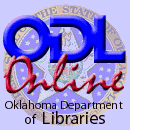

|
|
|
|
|
|

The Oklahoma Literacy Resource Office
Oklahoma
Dept. of Libraries
200 NE 18th St
Oklahoma City,
Oklahoma
73105-3298
(405) 522-3205
(405) 525-7804—FAX
Literacy Fact Sheet: Early Literacy
"You may have tangible wealth untold, caskets of jewels and coffers of gold. Richer than I you can never be; I had a mother who read to me."—Strickland Gillilan
Parental involvement is the number one predictor of early literacy success and future academic achievement of a child. In fact, a mother’s education is one of the primary indicators of a child’s academic success. – National Center for Families Learning
Early language and literacy (reading and writing) development begins in the first three years of life and is closely linked to the child’s earliest experiences with books and stories. The interactions that young children have with such literacy materials as books, paper, and crayons, and with the adults in their lives are the building blocks for language, reading, and writing development. —Zero to Three
Facts
- Less than 47% of children whose mothers did not complete high school are school ready, compared to 83% of children whose mothers have a bachelor’s degree. —Barbara Bush Foundation for Family Literacy
- By age 3, children in middle and upper class families have heard words millions more times than those of less educated, low-income parents, giving the children who have heard more words a distinct advantage in school. Research show that these gaps emerge as early as 18 months age—New York Times, "Pediatrics Group to Recommend Reading Aloud to Children From Birth"
- If a child is not reading proficiently by 3rd grade, they are four times more likely to drop out of high school.—Barbara Bush Foundation for Family Literacy
- Every year, more than three million youth drop out of school. They join the 6.7 million youth between the ages of 16 and 24 who are neither enrolled in school nor participating in the labor force. —World Education
- More than 1 in 3 American children start kindergarten without the language skills they need to learn to read. —American Academy of Pediatrics
- • Each year, approximately 2/3 of children in the United States and 80% of those living below the poverty threshold fail to develop reading proficiency by the end of the third grade. —American Academy of Pediatrics
Ideas for Success
The American Academy of Pediatrics encourages parents to help prepare their children for success in school beginning at infancy by:
1. Reading together as a daily fun family activity.
2. Doing rhyming, playing, talking, and singing activities throughout the day.
3. Keeping routines and regular times for meals, play and sleeping
to help children know what they can expect and what is expected from them.
4. Giving praise for everyday successes.
5. Understanding that nurturing relations are the foundation of a healthy and
early brain and child development.
Select Resources
Books Build Connections (family toolkit for early literacy)
Early Literacy and Language Tips and Tools
National Center for Infants, Toddlers, and Families
National Center for Families Learning
To contact staff of the Literacy Resource Office, use ODL's Staff Contact Form or Department Contact Form.
